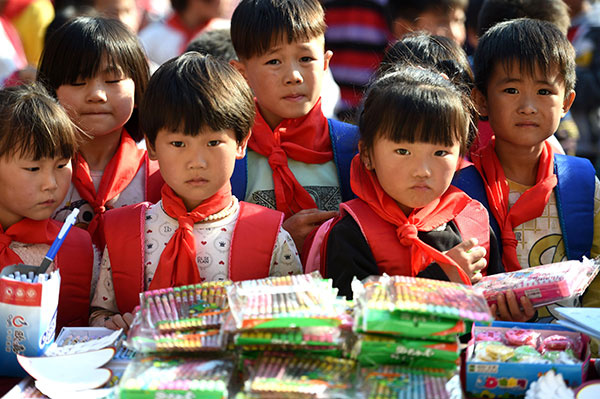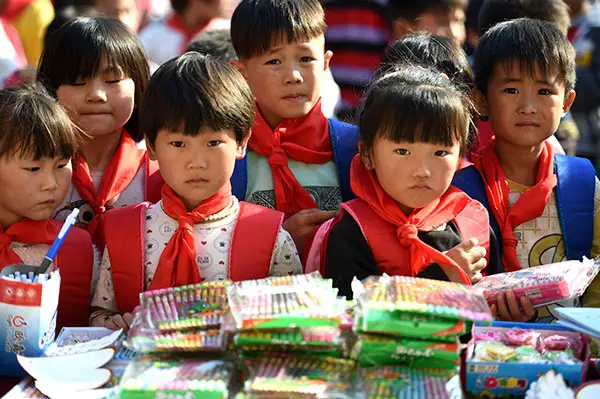By Nicholas Rosellini Source: People's Daily

October 17th marks the International Day for the Eradication of Poverty, an opportunity to remind us that ending poverty in all its forms everywhere by 2030 is an ambitious but achievable goal. Marking the day, UN Secretary-General Ban Ki-Moon stressed “we are approaching the end of the first year of implementing the 2030 Agenda for Sustainable Development, a universal vision for peace, prosperity and dignity for all people, achieving this objective is inconceivable without fulfilling the mandate of SDG 1 to end poverty in all its forms.”
Having joined the UN 30 years ago and enjoyed over 20 years working in the Asia-Pacific region, I have watched China grow and develop into the world’s second largest economy. This year marks the third year China has also adopted today as the National Poverty Reduction Day. There is no doubt that China has made remarkable strides in reducing poverty levels. Once a country with over 942 million living in poverty, it has now reduced this to 55 million. Additionally, with a targeted poverty alleviation strategy in the 13th Five-Year Plan (FYP), poverty will become a history for China by 2020, leaving no one behind.
The figures certainly highlight an impressive achievement but what further intrigues me is what actions have made this possible. Looking back we can see that China has evolved through varied stages of development. As social-economic and environmental contexts have developed, the drivers of poverty have changed, and so have the approaches to addressing it. Broadly speaking, poverty reduction has become increasingly institutionalized, more targeted and multi-dimensional. This means going beyond seeing poverty as merely a lack of income or what is necessary for material well-being — such as food, housing and land– and exploring other essential factors such as access to education, healthcare and inclusiveness in society. At the same time China has needed to address accompanying rapid economic growth, industrialization and urbanization.
Looking towards the future, China’s newly devised targeted poverty alleviation strategy has again demonstrated China’s resilience in tackling poverty issues. Adopted at a time when China is confronted with the urgency to transform for further economic growth, the strategy has laid out different approaches – ecological conservation, education, social protection and industrial development, that all highlight the importance of sustainability, particularly in social and environment spheres, when it comes to reducing poverty. These efforts are also well in line with the globally-adopted Sustainable Development Goals (SDGs), and if the strategy is effectively implemented, it will contribute to realizing job creation, public services provision, sustainable urbanization and natural resources conservation, just to name a few.
However the challenge still remains to make poverty reduction inclusive, while considering the integration of the SDGs and this is where the UN system can play a vital role in supporting China.
First, the UN can continue bringing international perspectives and experience for China but it also provides a platform, through south-south cooperation, to disseminate China’s experience and help other countries with poverty reduction efforts.
Second, the success of poverty elevation and the broader SDGs agenda will happen at the local level. The UN has been supporting implementation of the Millennium Development Goals (MDGs) locally, and has a vast experience to apply to the SDG era. Local governments play a leading role, and the UN will provide an integrated and long-term solutions for success.
Third, the UN can help monitor the poverty achievements to support long-term strategies for sustainability of the efforts. Poverty is dynamic, and using innovative approaches to help identify and track the poor in a more real-time and real-place manner will be vital. The UN has experience globally, and can assist in China to experiment with alternative instruments, such as using “Big Data”, to complement the traditional household surveys that feed the national database. Moreover, with more and more financial resources being allocated for poverty reduction, the UN can assist with effective implementation, including through assessing the cost-effectiveness of public spending, via setting up an overarching appraisal system.
China’s progress towards eradicating poverty is unprecedented. Soon I will start my tenure in China and together with the UN system, I look forward to China continuing to move along the development path to achieve sustainable development economically, socially and environmentally.
(The author is Designated United Nations Resident Coordinator in China)
Having joined the UN 30 years ago and enjoyed over 20 years working in the Asia-Pacific region, I have watched China grow and develop into the world’s second largest economy. This year marks the third year China has also adopted today as the National Poverty Reduction Day. There is no doubt that China has made remarkable strides in reducing poverty levels. Once a country with over 942 million living in poverty, it has now reduced this to 55 million. Additionally, with a targeted poverty alleviation strategy in the 13th Five-Year Plan (FYP), poverty will become a history for China by 2020, leaving no one behind.
The figures certainly highlight an impressive achievement but what further intrigues me is what actions have made this possible. Looking back we can see that China has evolved through varied stages of development. As social-economic and environmental contexts have developed, the drivers of poverty have changed, and so have the approaches to addressing it. Broadly speaking, poverty reduction has become increasingly institutionalized, more targeted and multi-dimensional. This means going beyond seeing poverty as merely a lack of income or what is necessary for material well-being — such as food, housing and land– and exploring other essential factors such as access to education, healthcare and inclusiveness in society. At the same time China has needed to address accompanying rapid economic growth, industrialization and urbanization.
Looking towards the future, China’s newly devised targeted poverty alleviation strategy has again demonstrated China’s resilience in tackling poverty issues. Adopted at a time when China is confronted with the urgency to transform for further economic growth, the strategy has laid out different approaches – ecological conservation, education, social protection and industrial development, that all highlight the importance of sustainability, particularly in social and environment spheres, when it comes to reducing poverty. These efforts are also well in line with the globally-adopted Sustainable Development Goals (SDGs), and if the strategy is effectively implemented, it will contribute to realizing job creation, public services provision, sustainable urbanization and natural resources conservation, just to name a few.
However the challenge still remains to make poverty reduction inclusive, while considering the integration of the SDGs and this is where the UN system can play a vital role in supporting China.
First, the UN can continue bringing international perspectives and experience for China but it also provides a platform, through south-south cooperation, to disseminate China’s experience and help other countries with poverty reduction efforts.
Second, the success of poverty elevation and the broader SDGs agenda will happen at the local level. The UN has been supporting implementation of the Millennium Development Goals (MDGs) locally, and has a vast experience to apply to the SDG era. Local governments play a leading role, and the UN will provide an integrated and long-term solutions for success.
Third, the UN can help monitor the poverty achievements to support long-term strategies for sustainability of the efforts. Poverty is dynamic, and using innovative approaches to help identify and track the poor in a more real-time and real-place manner will be vital. The UN has experience globally, and can assist in China to experiment with alternative instruments, such as using “Big Data”, to complement the traditional household surveys that feed the national database. Moreover, with more and more financial resources being allocated for poverty reduction, the UN can assist with effective implementation, including through assessing the cost-effectiveness of public spending, via setting up an overarching appraisal system.
China’s progress towards eradicating poverty is unprecedented. Soon I will start my tenure in China and together with the UN system, I look forward to China continuing to move along the development path to achieve sustainable development economically, socially and environmentally.
(The author is Designated United Nations Resident Coordinator in China)
 Menu
Menu
 China’s progress towards eradicating poverty is unprecedented
China’s progress towards eradicating poverty is unprecedented
















